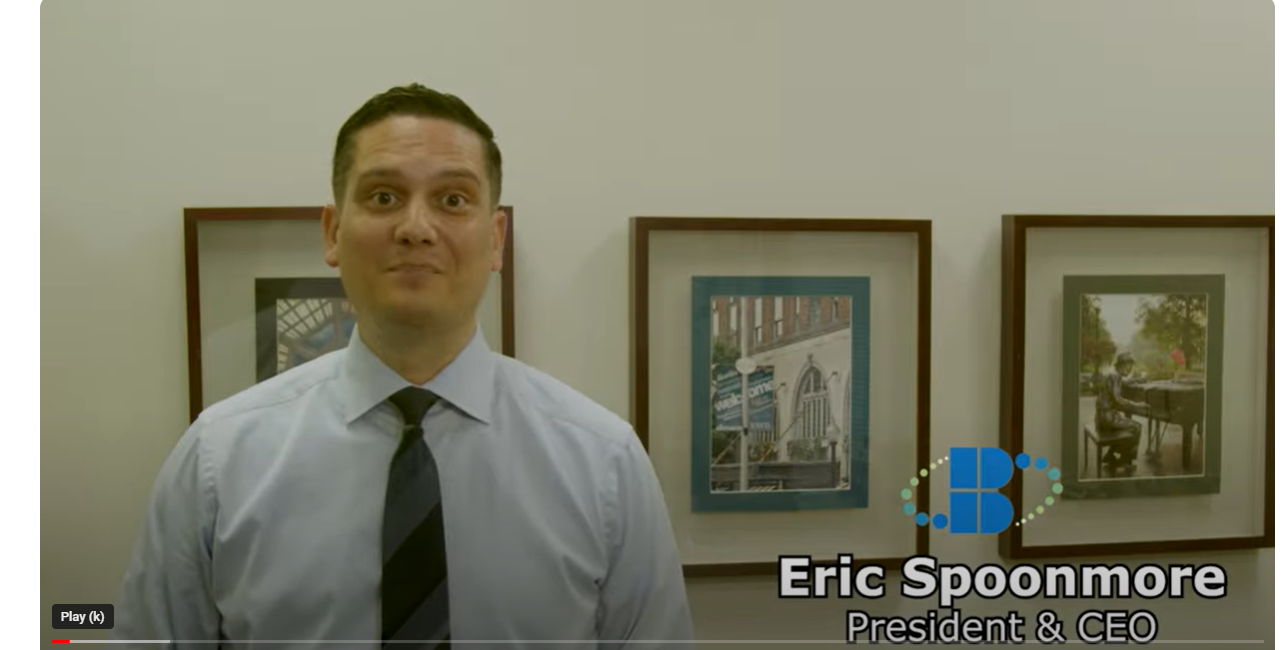 Economic development over the last three decades has evolved. No longer is the basic strategy of lavishing corporations with incentives to move or expand enough or even the best use of resources. Low taxes and little regulation can only push the economy so much. Mississippi prides itself on low corporate taxes and little regulation, yet it's hard to find its success story. US News ranks their economy dead last. Right now, skilled labor is at a premium. At no time in this country’s history has labor been more mobile. Workers can choose where to live. Quality of place takes center stage. Communities need to provide the amenities young professionals and families are looking for. Parks, trails, safety, a vibrant downtown take center stage. One area of quality of life where the Greater Bloomington Chamber of Commerce (GBCC) was ahead of the curve is its investment in K–12 public education agencies. In 1999, the Chamber formed its 501-C3 foundation, or “feel-good” arm, called the Franklin Initiative. Since 2019, it has been known as the Success School. While Indiana has blindly moved its focus toward charter schools and vouchers, the Chamber has doubled down on partnering with our two award-winning school districts in the county. GBCC understood that families probe, “How are the schools?” when contemplating a move into a community. Both MCCSC and RBB provide a sense of identify and civic pride. The Success School is a vehicle for the GBCC to provide a community benefit that uniquely fits our mission with the resources only the Chamber can provide. It connects students’ learning to real-world experiences to motivate them to gain the knowledge, skills, and abilities necessary to achieve. It facilitates partnerships and programs between the education and business communities that increase student engagement. The Chamber’s 850+ members across multiple sectors enjoy sharing their passion with our local youth. These volunteer opportunities also help retain employees by building a connection to the community and its future. While the Success School has had its peaks and valleys, the 2023-2024 school year proved to have one of our largest impacts. See Below:
0 Comments
 For the past several years, the Greater Bloomington Chamber of Commerce has advocated for policies and solutions designed to harness the potential of existing vacant commercial property in Bloomington. In 2021, the Chamber partnered with MPA students from IU's O'Neill School for a capstone project to analyze revitalization efforts in other cities and to provide recommendations for both the Chamber and the City to consider going forward. That report can be found here. Written just as the pandemic was beginning to wane and the world was returning to some sense of normalcy, this report provided a number of recommendations to help Bloomington bounce back from the difficulties of the pandemic. Nearly three years later, many of these recommendations still ring true. Time has also given us the opportunity to analyze new proposals, analyze data on established proposals, and determine which proposals have risen to the top as "best practices". Below are some proposals designed to activate vacant properties that have caught our eye and could be a basis for further consideration going forward.
An interesting proposal could also see the creation of a Makers Collective. This proposal would bring a food hall setup to non-culinary uses. This would allow smaller startups to gain traction in the local community while operating in a low-cost system. Under this system, a master tenant or building management company can lease a large space & subdivide it into smaller units. Given Bloomington's unique profile as a university town with a fantastic business school and strong research capabilities, this Makers Collective model could also be re-tooled into a grant-supported start-up program in coordination with IU Ventures or the Bloomington Urban Enterprise Association. A great model for this is Berlin Technical University's EINS start-up space. Whether proposed as part of the O'Neill capstone project or showcased as examples in this post, it is clear that there are a lot of ways that the vacant first-floor commercial space in Bloomington can be reactivated to help boost and diversify our city's economy. It's now up to city administrators and business leaders to find a model that best fits for Bloomington and to bring it forward. Above is a short video from Eric Spoonmore, President/CEO of the Greater Chamber of Commerce. Here, he outlines the mathematics on why voting in the Democratic Primary on May 7th is in your best interest. He will also take the time to explain myths associated with party alignment in the state of Indiana.
 While Bloomington and the surrounding area is known more for its lakes than rivers, there has, nonetheless, been a proposal to create a riverfront district in Bloomington. Per Indiana code, a "river" is defined as any flowing body of water (or even a part of a body of water) and adjacent land. This broad definition gives communities wide latitude when setting up a riverfront district. The Bloomington proposal would see Miller-Showers Park (with its flowing canal) and the surrounding area designated as such a district. But what is a riverfront district and why is it important? In Indiana, businesses within a riverfront district may apply for an alcohol permit through the state's Alcohol & Tobacco Commission, regardless of the quota allotted to their municipality. This could also help to free up permits currently being used in Bloomington if a permit holder decided to relaunch in the riverfront district. While a recent sale of a three-way liquor license garnered up to $275,000 here in Bloomington, recipients of the riverfront liquor licenses pay an annual fee of $1,000. The north side of Bloomington is seeing rapid residential growth and encounters a lot of tourists coming to Bloomington for sports events. Yet the northside also lacks an anchor. A Miller-Showers riverfront district could be such an anchor and would be a huge boon for economic development and revitalization efforts on the north side of town. Furthermore, such a district would help to increase visitors to the park and enhance the Bicentennial Gateway area. Many cities like Carmel, South Bend, Columbus, Madison, Kokomo, and more have successfully implemented a riverfront district. Is it time for Bloomington to get in the game as well? The "river" at Miller-Showers Park might be small, but its economic impact could be mighty if the city were to adopt a riverfront district there.  Indiana's 2024 whirlwind legislative session drew to a close on Friday, March 8th. Leadership in both chambers had signaled an intent to keep this year's session short--presumably to allow members maximum time to campaign in an election year. While brief, this session still had its fair share of fireworks (particularly around dedicated bus lanes, wetlands, child labor, higher education, and antisemitism) and a number of bills have been sent to Governor Holcomb for his signature. Two bills that the Chamber tracked and publicly took a stance on met different fates. HB 1108, authored by Rep. Dave Hall, passed both chambers and was signed into law by the Governor. This bill eases slope restrictions for residential development, expanding the amount of usable land for housing in Monroe County. Given Monroe County's extreme housing shortage, the Chamber supports a variety of housing options to help ease the pressure on the market. Check out our previous Advocacy Matters post for the Chamber's testimony on this bill. SB 52, which would have prohibited dedicated bus lanes, looked as if it was on course to pass both chambers before falling at the 11th hour. While this bill was nominally intended to target Indianapolis' Blue Line, the Chamber raised concerns about the impact such legislation could have on planned transit projects in Monroe County and the way in which federal funding for future projects could be jeopardized. A deal between the City of Indianapolis, statehouse leaders, and IndyGo means this bill did come for a final vote in the House. IndyGo-related legislation has become somewhat of a theme in recent statehouse sessions so don't be surprised if this issue comes up again next session. Other bills that got a lot of attention included:
Having worked as a legislative assistant in the two legislative sessions prior this one, it was a strange feeling not being at the Statehouse every day getting intimately involved with the various pieces of legislation. Session, whether long or short, is often chaotic but I have fond memories of my time there and encourage everyone to watch session (either online or in-person in the gallery) and committee hearings. I firmly believe in civic engagement and that it is important for residents across our state to understand how the legislative process works. This week saw legislators return from a mini-break to discuss and vote on bills from opposite chambers. Bills that did not pass out of their original chamber are essentially done for the session (though bills that were not explicitly voted down can still be amended into other bills). The process from the first half of the session repeats itself. Bills are heard in committee, opened up for amendments on 2nd reading, and voted up or down on 3rd reading. If a bill differs from how it passed in the original chamber, it will often go to a conference committee where representatives from each chamber will work out a compromise bill for a final vote. Bills that are passed are then sent to the Governor to either sign or veto. Both chambers are statutorily obligated to end this session no later than April 14th, though leaders have suggested they'd like to end a week earlier. The Greater Bloomington Chamber of Commerce has been tracking numerous bills. Two bills that the Chamber submitted testimony for have passed their original chambers and are currently being debated. SB 52 prohibits the use of dedicated lanes for public transportation projects. Given the impact this bill could have on any potential transit projects in Bloomington (particularly the East-West corridor), the Chamber spoke in opposition to this bill. Transit is essential to connecting people to homes, work, and amenities. You can read our testimony below. The Chamber also submitted testimony in support of Rep. Dave Hall's HB 1108. This bill would ease slope restrictions for development from 15% to 25% while making protections for watershed areas. Given the affordable housing crisis that Monroe County is facing, the Chamber supports this legislation. Easing development restrictions will increase housing supply and bring much-needed relief to our community. You can read our testimony below. To stay up-to-date on legislative happenings, you can always visit iga.in.gov/
The Indiana State Legislative Session kicked off on January 8th. At the end of the 2nd week, some bills in both houses have passed the first hurdle of making it through their committee, some have been assigned to their chamber's respective rules committee (essentially the legislative graveyard), and one bill has even managed to get a second chance after initially being left for dead in rules committee.
As is customary during the first week, caucus leaders in both chambers highlighted their priorities and hopes for the upcoming session. House and Senate leaders pointed to a desire for a relatively simple session after years of heavy-hitting controversial sessions. As a former staffer, however, I'm still expecting a few flashpoints and won't be changing the channel quite yet. By-and-large, leadership in both chambers indicated an interest in addressing childcare needs (something highlighted by the state chamber), reading proficiency levels, and workforce development. With this being a shorter session, things will pick up speed over the coming weeks. The last day for the House to hear bills in committee is January 30th and the last day for the Senate is February 1st. Bills will then have to be passed by their respective chamber before being swapped and heard in the other chamber where the process will start again. With a goal to adjourn by April 14th, expect some twists and turns over the coming months. For a full list of bills for the 2024 session, you can visit this site. Bills that are still alive will be displayed in blue and bills that have died will be displayed in gray. You can also use this link to see what legislation your elected officials have put forward and where that legislation stands. If you need a refresher as to who represents you at the Statehouse, you can search here by entering in your address. Committees and floor sessions are also available for online viewing both live and recorded. Upcoming committee meetings can be found on the main landing page of the iga.in.gov website. To access recordings from committees or floor sessions, you can use this link and select the specific recording you're trying to watch.  With "downtown aesthetics" garnering a lot of attention on our recent 2024 Legislative Priorities survey and Indianapolis' recent proposal for an Economic Enhancement District, we thought it might be helpful to break down some of the core ideas of these enhancement and improvement districts. Similar districts to the one proposed in Indianapolis have been implemented in a number of metropolitan areas like Denver, San Diego, and Columbus, Ohio. While the finer details may vary, these districts are often funded through specialized tax or other assessed revenue streams paid by property owners in the district. In Indianapolis' plan, as highlighted by the IndyStar, homeowners pay a fixed fee of $250/year while the fee for all other property owners is just under 17% of the property's gross assessed value. Indy hopes to collect an annual $5.5 million to put towards public safety, homelessness outreach, cleaning services/maintenance, a low barrier housing shelter, and more. These districts, and their funds, are usually managed by a board represented by various property owners within the district. These districts are not without their share of controversy, however, and considerations should be made when deciding whether or not to implement them. Some critics argue that local government entities should be the ones responsible for maintenance of public areas and that they should foot the bill, not downtown property owners. Critiques also revolve around perceptions of special treatment for downtown property owners who receive these services while other property owners may not. Finally, some concerns exist about the potential for inequitable representation on district boards and who will have a voice (and a place) in these districts. Indianpolis' new Economic Enhancement District will be an interesting case study for how the process works in Central Indiana and may offer some templates for Bloomington should they also want to consider a specialized downtown district in the future. Managing Higher Seasonal Bills: Tips to Help Customers Control Their Energy Use and Costs11/15/2023  Thanksgiving is around the corner and that means we're creeping towards winter and colder temperatures (though it's a reasonable 66 degrees as I write this). That means many are going to be checking their furnace filters and preparing to crank up the heat. With the cost of living still quite high, however, the added energy costs can put a real strain on budgets. Here are some tips from Duke Energy to help you track your energy usage and save. Tracking Energy Use Customers with a Duke online account can track their usage online or through the mobile app. More information can be found here. Customers can also sign up to receive usage alerts via email or text. Flexible Payments Duke offers interest-free installment plans and due date extensions. Customers can also sign up for budget billing which lets them pay one predictable amount (adjusted periodically) every month. Additionally, customers can pick their own due date to better account for other expenses or to align with paychecks. Financial Assistance Duke partners with the Indiana Community Action Association to administer and distribute the Share the Light Fund to qualifying customers. The State of Indiana also administers an energy assistance program to provide assistance to customers in heating their homes. You can read more about Duke Energy's programs here.  After ten 2.5-hour sessions, and topics ranging from evidence to domestic violence, and social work to firearms, I had the pleasure of graduating from the City of Bloomington Citizens Police Academy hosted by the Bloomington Police Department (BPD). Unlike many of the other dozen or so participants, this was not about me reliving my interest in being a cop or my appreciation of crime shows (I do enjoy the French Connection). Never has this career path crossed my mind. In contrast, my role at The Greater Bloomington Chamber of Commerce is to advocate for business. One area we have prioritized during the last two years remains public safety. This was the ideal opportunity to gain experience firsthand about an issue I deal with as part of my professional and residential life as a homeowner in Bloomington. Plus, I am a proud alum of the Residence Academy and Leaders Bloomington-Monroe County. I enjoy civic engagement, learning about my community and the people who make it such a wonderful place to live. Coming into the class, my interactions over the last 11 years with the BPD have been nothing but positive. Previously, I had done ride-alongs with officers as part of my local government MPA. I found them engaging and far more humorous than I was expecting. The times I have been pulled over for a traffic stop in town (California stops), the officers have been nothing but courteous. In contrast, before moving here, I would describe my view of policing in this country as negative through first-hand experience. This is putting it mildly. My role in these academy sessions was not simply to pile on praise to law enforcement officials for their sacrifice but to ask tough questions, and to bring to light issues from the public safety angle. "Why not do it this way?" Being in a small class provided me with the luxury of having these pointed conversations. I came away impressed with the dedication, the service, and the community nature of the BPD. The culture there goes a long way in removing bad apples. That culture at BPD is enhanced by the rigorous hiring standards it upholds that are in line with this community's values. The course itself was enjoyable. Multiple firsthand activities included a domestic dispute simulation with prop firearms, a tour and demonstration at the Dispatch Center, a look inside the armored rescue vehicle, an up-close look at various narcotics detained in evidence, and an illustration of how their defense tactics work. I had the wherewithal not to volunteer for the last one. Takeaway: Important to judge the BPD by their own actions and not by the general state of policing in this country Highlight: Getting car sick in the back seat of a police vehicle while driving during a training module exercise on a terminal at the Monroe County Airport |
Categories
Categories
All
Archives
Archives
May 2024
|
||||||||||||
|
Copyright The Greater Bloomington Chamber of Commerce. All Rights Reserved.




 RSS Feed
RSS Feed
